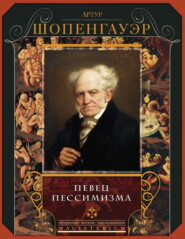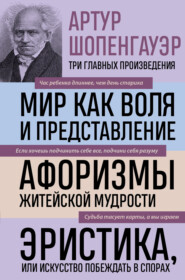По всем вопросам обращайтесь на: info@litportal.ru
(©) 2003-2024.
✖
The Essays of Arthur Schopenhauer; Counsels and Maxims
Настройки чтения
Размер шрифта
Высота строк
Поля
If it is impossible to resist the effects of some external influence by the mere play of thought, the best thing to do is to neutralize it by some contrary influence; for example, the effect of an insult may be overcome by seeking the society of those who have a good opinion of us; and the unpleasant sensation of imminent danger may be avoided by fixing our attention on the means of warding it off.
Leibnitz[30 - Nouveaux Essais. Liv. I. ch. 2. Sec. 11.] tells of an Italian who managed to bear up under the tortures of the rack by never for a moment ceasing to think of the gallows which would have awaited him, had he revealed his secret; he kept on crying out: I see it! I see it! – afterwards explaining that this was part of his plan.
It is from some such reason as this, that we find it so difficult to stand alone in a matter of opinion, – not to be made irresolute by the fact that everyone else disagrees with us and acts accordingly, even though we are quite sure that they are in the wrong. Take the case of a fugitive king who is trying to avoid capture; how much consolation he must find in the ceremonious and submissive attitude of a faithful follower, exhibited secretly so as not to betray his master's strict incognito; it must be almost necessary to prevent him doubting his own existence.
SECTION 20. In the first part of this work I have insisted upon the great value of health as the chief and most important element in happiness. Let me emphasize and confirm what I have there said by giving a few general rules as to its preservation.
The way to harden the body is to impose a great deal of labor and effort upon it in the days of good health, – to exercise it, both as a whole and in its several parts, and to habituate it to withstand all kinds of noxious influences. But on the appearance of an illness or disorder, either in the body as a whole or in many of its parts, a contrary course should be taken, and every means used to nurse the body, or the part of it which is affected, and to spare it any effort; for what is ailing and debilitated cannot be hardened.
The muscles may be strengthened by a vigorous use of them; but not so the nerves; they are weakened by it. Therefore, while exercising the muscles in every way that is suitable, care should be taken to spare the nerves as much as possible. The eyes, for instance, should be protected from too strong a light, – especially when it is reflected light, – from any straining of them in the dark, or from the long-continued examination of minute objects; and the ears from too loud sounds. Above all, the brain should never be forced, or used too much, or at the wrong time; let it have a rest during digestion; for then the same vital energy which forms thoughts in the brain has a great deal of work to do elsewhere, – I mean in the digestive organs, where it prepares chyme and chyle. For similar reasons, the brain should never be used during, or immediately after, violent muscular exercise. For the motor nerves are in this respect on a par with the sensory nerves; the pain felt when a limb is wounded has its seat in the brain; and, in the same way, it is not really our legs and arms which work and move, – it is the brain, or, more strictly, that part of it which, through the medium of the spine, excites the nerves in the limbs and sets them in motion. Accordingly, when our arms and legs feel tired, the true seat of this feeling is in the brain. This is why it is only in connection with those muscles which are set in motion consciously and voluntarily, – in other words, depend for their action upon the brain, – that any feeling of fatigue can arise; this is not the case with those muscles which work involuntarily, like the heart. It is obvious, then, that injury is done to the brain if violent muscular exercise and intellectual exertion are forced upon it at the same moment, or at very short intervals.
What I say stands in no contradiction with the fact that at the beginning of a walk, or at any period of a short stroll, there often comes a feeling of enhanced intellectual vigor. The parts of the brain that come into play have had no time to become tired; and besides, slight muscular exercise conduces to activity of the respiratory organs, and causes a purer and more oxydated supply of arterial blood to mount to the brain.
It is most important to allow the brain the full measure of sleep which is required to restore it; for sleep is to a man's whole nature what winding up is to a clock.[31 - Of. Welt als Wille und Vorstellung, 4th Edition. Bk. II. pp. 236-40.] This measure will vary directly with the development and activity of the brain; to overstep the measure is mere waste of time, because if that is done, sleep gains only so much in length as it loses in depth.[32 - Cf. loc: cit: p. 275. Sleep is a morsel of death borrowed to keep up and renew the part of life which is exhausted by the day —le sommeil est un emprunt fait à la mort. Or it might be said that sleep is the interest we have to pay on the capital which is called in at death; and the higher the rate of interest and the more regularly it is paid, the further the date of redemption is postponed.]
It should be clearly understood that thought is nothing but the organic function of the brain; and it has to obey the same laws in regard to exertion and repose as any other organic function. The brain can be ruined by overstrain, just like the eyes. As the function of the stomach is to digest, so it is that of the brain to think. The notion of a soul, – as something elementary and immaterial, merely lodging in the brain and needing nothing at all for the performance of its essential function, which consists in always and unweariedly thinking– has undoubtedly driven many people to foolish practices, leading to a deadening of the intellectual powers; Frederick the Great, even, once tried to form the habit of doing without sleep altogether. It would be well if professors of philosophy refrained from giving currency to a notion which is attended by practical results of a pernicious character; but then this is just what professorial philosophy does, in its old-womanish endeavor to keep on good terms with the catechism. A man should accustom himself to view his intellectual capacities in no other light than that of physiological functions, and to manage them accordingly – nursing or exercising them as the case may be; remembering that every kind of physical suffering, malady or disorder, in whatever part of the body it occurs, has its effect upon the mind. The best advice that I know on this subject is given by Cabanis in his Rapports du physique et du moral de l'homme.[33 - Translator's Note. The work to which Schopenhauer here refers is a series of essays by Cabanis, a French philosopher (1757-1808), treating of mental and moral phenomena on a physiological basis. In his later days, Cabanis completely abandoned his materialistic standpoint.]
Through neglect of this rule, many men of genius and great scholars have become weak-minded and childish, or even gone quite mad, as they grew old. To take no other instances, there can be no doubt that the celebrated English poets of the early part of this century, Scott, Wordsworth, Southey, became intellectually dull and incapable towards the end of their days, nay, soon after passing their sixtieth year; and that their imbecility can be traced to the fact that, at that period of life, they were all led on? by the promise of high pay, to treat literature as a trade and to write for money. This seduced them into an unnatural abuse of their intellectual powers; and a man who puts his Pegasus into harness, and urges on his Muse with the whip, will have to pay a penalty similar to that which is exacted by the abuse of other kinds of power.
And even in the case of Kant, I suspect that the second childhood of his last four years was due to overwork in later life, and after he had succeeded in becoming a famous man.
Every month of the year has its own peculiar and direct influence upon health and bodily condition generally; nay, even upon the state of the mind. It is an influence dependent upon the weather.
CHAPTER III
OUR RELATION TO OTHERS. – SECTION 21.
In making his way through life, a man will find it useful to be ready and able to do two things: to look ahead and to overlook: the one will protect him from loss and injury, the other from disputes and squabbles.
No one who has to live amongst men should absolutely discard any person who has his due place in the order of nature, even though he is very wicked or contemptible or ridiculous. He must accept him as an unalterable fact – unalterable, because the necessary outcome of an eternal, fundamental principle; and in bad cases he should remember the words of Mephistopheles: es muss auch solche Käuze geben[34 - Goethe's Faust, Part I.]– there must be fools and rogues in the world. If he acts otherwise, he will be committing an injustice, and giving a challenge of life and death to the man he discards. No one can alter his own peculiar individuality, his moral character, his intellectual capacity, his temperament or physique; and if we go so far as to condemn a man from every point of view, there will be nothing left him but to engage us in deadly conflict; for we are practically allowing him the right to exist only on condition that he becomes another man – which is impossible; his nature forbids it.
So if you have to live amongst men, you must allow everyone the right to exist in accordance with the character he has, whatever it turns out to be: and all you should strive to do is to make use of this character in such a way as its kind and nature permit, rather than to hope for any alteration in it, or to condemn it off-hand for what it is. This is the true sense of the maxim – Live and let live. That, however, is a task which is difficult in proportion as it is right; and he is a happy man who can once for all avoid having to do with a great many of his fellow creatures.
The art of putting up with people may be learned by practicing patience on inanimate objects, which, in virtue of some mechanical or general physical necessity, oppose a stubborn resistance to our freedom of action – a form of patience which is required every day. The patience thus gained may be applied to our dealings with men, by accustoming ourselves to regard their opposition, wherever we encounter it, as the inevitable outcome of their nature, which sets itself up against us in virtue of the same rigid law of necessity as governs the resistance of inanimate objects. To become indignant at their conduct is as foolish as to be angry with a stone because it rolls into your path. And with many people the wisest thing you can do, is to resolve to make use of those whom you cannot alter.
SECTION 22. It is astonishing how easily and how quickly similarity, or difference of mind and disposition, makes itself felt between one man and another as soon as they begin to talk: every little trifle shows it. When two people of totally different natures are conversing, almost everything said by the one will, in a greater or less degree, displease the other, and in many cases produce positive annoyance; even though the conversation turn upon the most out-of-the-way subject, or one in which neither of the parties has any real interest. People of similar nature, on the other hand, immediately come to feel a kind of general agreement; and if they are cast very much in the same mould, complete harmony or even unison will flow from their intercourse.
This explain two circumstances. First of all, it shows why it is that common, ordinary people are so sociable and find good company wherever they go. Ah! those good, dear, brave people. It is just the contrary with those who are not of the common run; and the less they are so, the more unsociable they become; so that if, in their isolation, they chance to come across some one in whose nature they can find even a single sympathetic chord, be it never so minute, they show extraordinary pleasure in his society. For one man can be to another only so much as the other is to him. Great minds are like eagles, and build their nest in some lofty solitude.
Secondly, we are enabled to understand how it is that people of like disposition so quickly get on with one another, as though they were drawn together by magnetic force – kindred souls greeting each other from afar. Of course the most frequent opportunity of observing this is afforded by people of vulgar tastes and inferior intellect, but only because their name is legion; while those who are better off in this respect and of a rarer nature, are not often to be met with: they are called rare because you can seldom find them.
Take the case of a large number of people who have formed themselves into a league for the purpose of carrying out some practical object; if there be two rascals among them, they will recognize each other as readily as if they bore a similar badge, and will at once conspire for some misfeasance or treachery. In the same way, if you can imagine —per impossible– a large company of very intelligent and clever people, amongst whom there are only two blockheads, these two will be sure to be drawn together by a feeling of sympathy, and each of them will very soon secretly rejoice at having found at least one intelligent person in the whole company. It is really quite curious to see how two such men, especially if they are morally and intellectually of an inferior type, will recognize each other at first sight; with what zeal they will strive to become intimate; how affably and cheerily they will run to greet each other, just as though they were old friends; – it is all so striking that one is tempted to embrace the Buddhist doctrine of metempsychosis and presume that they were on familiar terms in some former state of existence.
Still, in spite of all this general agreement, men are kept apart who might come together; or, in some cases, a passing discord springs up between them. This is due to diversity of mood. You will hardly ever see two people exactly in the same frame of mind; for that is something which varies with their condition of life, occupation, surroundings, health, the train of thought they are in at the moment, and so on. These differences give rise to discord between persons of the most harmonious disposition. To correct the balance properly, so as to remove the disturbance – to introduce, as it were, a uniform temperature, – is a work demanding a very high degree of culture. The extent to which uniformity of mood is productive of good-fellowship may be measured by its effects upon a large company. When, for instance, a great many people are gathered together and presented with some objective interest which works upon all alike and influences them in a similar way, no matter what it be – a common danger or hope, some great news, a spectacle, a play, a piece of music, or anything of that kind – you will find them roused to a mutual expression of thought, and a display of sincere interest. There will be a general feeling of pleasure amongst them; for that which attracts their attention produces a unity of mood by overpowering all private and personal interests.
And in default of some objective interest of the kind I have mentioned, recourse is usually had to something subjective. A bottle of wine is not an uncommon means of introducing a mutual feeling of fellowship; and even tea and coffee are used for a like end.
The discord which so easily finds its way into all society as an effect of the different moods in which people happen to be for the moment, also in part explains why it is that memory always idealizes, and sometimes almost transfigures, the attitude we have taken up at any period of the past – a change due to our inability to remember all the fleeting influences which disturbed us on any given occasion. Memory is in this respect like the lens of a camera obscura: it contracts everything within its range, and so produces a much finer picture than the actual landscape affords. And, in the case of a man, absence always goes some way towards securing this advantageous light; for though the idealizing tendency of the memory requires times to complete its work, it begins it at once. Hence it is a prudent thing to see your friends and acquaintances only at considerable intervals of time; and on meeting them again, you will observe that memory has been at work.
SECTION 23. No man can see over his own height. Let me explain what I mean.
You cannot see in another man any more than you have in yourself; and your own intelligence strictly determines the extent to which he comes within its grasp. If your intelligence is of a very low order, mental qualities in another, even though they be of the highest kind, will have no effect at all upon you; you will see nothing in their possessor except the meanest side of his individuality – in other words, just those parts of his character and disposition which are weak and defective. Your whole estimate of the man will be confined to his defects, and his higher mental qualities will no more exist for you than colors exist for those who cannot see.
Intellect is invisible to the man who has none. In any attempt to criticise another's work, the range of knowledge possessed by the critic is as essential a part of his verdict as the claims of the work itself.
Hence intercourse with others involves a process of leveling down. The qualities which are present in one man, and absent in another, cannot come into play when they meet; and the self-sacrifice which this entails upon one of the parties, calls forth no recognition from the other.
Consider how sordid, how stupid, in a word, how vulgar most men are, and you will see that it is impossible to talk to them without becoming vulgar yourself for the time being. Vulgarity is in this respect like electricity; it is easily distributed. You will then fully appreciate the truth and propriety of the expression, to make yourself cheap; and you will be glad to avoid the society of people whose only possible point of contact with you is just that part of your nature of which you have least reason to be proud. So you will see that, in dealing with fools and blockheads, there is only one way of showing your intelligence – by having nothing to do with them. That means, of course, that when you go into society, you may now and then feel like a good dancer who gets an invitation to a ball, and on arriving, finds that everyone is lame: – with whom is he to dance?
SECTION 24. I feel respect for the man – and he is one in a hundred – who, when he is waiting or sitting unoccupied, refrains from rattling or beating time with anything that happens to be handy, – his stick, or knife and fork, or whatever else it may be. The probability is that he is thinking of something.
With a large number of people, it is quite evident that their power of sight completely dominates over their power of thought; they seem to be conscious of existence only when they are making a noise; unless indeed they happen to be smoking, for this serves a similar end. It is for the same reason that they never fail to be all eyes and ears for what is going on around them.
SECTION 25. La Rochefoucauld makes the striking remark that it is difficult to feel deep veneration and great affection for one and the same person. If this is so, we shall have to choose whether it is veneration or love that we want from our fellow-men.
Their love is always selfish, though in very different ways; and the means used to gain it are not always of a kind to make us proud. A man is loved by others mainly in the degree in which he moderates his claim on their good feeling and intelligence: but he must act genuinely in the matter and without dissimulation – not merely out of forbearance, which is at bottom a kind of contempt. This calls to mind a very true observation of Helvetius[35 - Translator's Note. Helvetius, Claude-Adrien (1715-71), a French philosophical writer much esteemed by Schopenhauer. His chief work, De l'Esprit, excited great interest and opposition at the time of its publication, on account of the author's pronounced materialism.]: the amount of intellect necessary to please us, is a most accurate measure of the amount of intellect we have ourselves. With these remarks as premises, it is easy to draw the conclusion.
Now with veneration the case is just the opposite; it is wrung from men reluctantly, and for that very reason mostly concealed. Hence, as compared with love, veneration gives more real satisfaction; for it is connected with personal value, and the same is not directly true of love, which is subjective in its nature, whilst veneration is objective. To be sure, it is more useful to be loved than to be venerated.
SECTION 26. Most men are so thoroughly subjective that nothing really interests them but themselves. They always think of their own case as soon as ever any remark is made, and their whole attention is engrossed and absorbed by the merest chance reference to anything which affects them personally, be it never so remote: with the result that they have no power left for forming an objective view of things, should the conversation take that turn; neither can they admit any validity in arguments which tell against their interest or their vanity. Hence their attention is easily distracted. They are so readily offended, insulted or annoyed, that in discussing any impersonal matter with them, no care is too great to avoid letting your remarks bear the slightest possible reference to the very worthy and sensitive individuals whom you have before you; for anything you may say will perhaps hurt their feelings. People really care about nothing that does not affect them personally. True and striking observations, fine, subtle and witty things are lost upon them: they cannot understand or feel them. But anything that disturbs their petty vanity in the most remote and indirect way, or reflects prejudicially upon their exceedingly precious selves – to that, they are most tenderly sensitive. In this respect they are like the little dog whose toes you are so apt to tread upon inadvertently – you know it by the shrill bark it sets up: or, again, they resemble a sick man covered with sores and boils, with whom the greatest care must be taken to avoid unnecessary handling. And in some people this feeling reaches such a pass that, if they are talking with anyone, and he exhibits, or does not sufficiently conceal, his intelligence and discernment, they look upon it as a downright insult; although for the moment they hide their ill will, and the unsuspecting author of it afterwards ruminates in vain upon their conduct, and racks his brain to discover what he could possibly have done to excite their malice and hatred.
But it is just as easy to flatter and win them over; and this is why their judgment is usually corrupt, and why their opinions are swayed, not by what is really true and right, but by the favor of the party or class to which they belong. And the ultimate reason of it all is, that in such people force of will greatly predominates over knowledge; and hence their meagre intellect is wholly given up to the service of the will, and can never free itself from that service for a moment.
Astrology furnishes a magnificent proof of this miserable subjective tendency in men, which leads them to see everything only as bearing upon themselves, and to think of nothing that is not straightway made into a personal matter. The aim of astrology is to bring the motions of the celestial bodies into relation with the wretched Ego and to establish a connection between a comet in the sky and squabbles and rascalities on earth.[36 - See, for instance, Stobasus, Eclog. I. xxii. 9.]
SECTION 27. When any wrong statement is made, whether in public or in society, or in books, and well received – or, at any rate, not refuted – that that is no reason why you should despair or think there the matter will rest. You should comfort yourself with the reflection that the question will be afterwards gradually subjected to examination; light will be thrown upon it; it will be thought over, considered, discussed, and generally in the end the correct view will be reached; so that, after a time – the length of which will depend upon the difficulty of the subject – everyone will come to understand that which a clear head saw at once.
In the meantime, of course, you must have patience. He who can see truly in the midst of general infatuation is like a man whose watch keeps good time, when all clocks in the town in which he lives are wrong. He alone knows the right time; but what use is that to him? for everyone goes by the clocks which speak false, not even excepting those who know that his watch is the only one that is right.
SECTION 28. Men are like children, in that, if you spoil them, they become naughty.
Therefore it is well not to be too indulgent or charitable with anyone. You may take it as a general rule that you will not lose a friend by refusing him a loan, but that you are very likely to do so by granting it; and, for similar reasons, you will not readily alienate people by being somewhat proud and careless in your behaviour; but if you are very kind and complaisant towards them, you will often make them arrogant and intolerable, and so a breach will ensue.
There is one thing that, more than any other, throws people absolutely off their balance – the thought that you are dependent upon them. This is sure to produce an insolent and domineering manner towards you. There are some people, indeed, who become rude if you enter into any kind of relation with them; for instance, if you have occasion to converse with them frequently upon confidential matters, they soon come to fancy that they can take liberties with you, and so they try and transgress the laws of politeness. This is why there are so few with whom you care to become more intimate, and why you should avoid familiarity with vulgar people. If a man comes to think that I am more dependent upon him than he is upon me, he at once feels as though I had stolen something from him; and his endeavor will be to have his vengeance and get it back. The only way to attain superiority in dealing with men, is to let it be seen that you are independent of them.
And in this view it is advisable to let everyone of your acquaintance – whether man or woman – feel now and then that you could very well dispense with their company. This will consolidate friendship. Nay, with most people there will be no harm in occasionally mixing a grain of disdain with your treatment of them; that will make them value your friendship all the more. Chi non istima vien stimato, as a subtle Italian proverb has it – to disregard is to win regard. But if we really think very highly of a person, we should conceal it from him like a crime. This is not a very gratifying thing to do, but it is right. Why, a dog will not bear being treated too kindly, let alone a man!
SECTION 29. It is often the case that people of noble character and great mental gifts betray a strange lack of worldly wisdom and a deficiency in the knowledge of men, more especially when they are young; with the result that it is easy to deceive or mislead them; and that, on the other hand, natures of the commoner sort are more ready and successful in making their way in the world.
The reason of this is that, when a man has little or no experience, he must judge by his own antecedent notions; and in matters demanding judgment, an antecedent notion is never on the same level as experience. For, with the commoner sort of people, an antecedent notion means just their own selfish point of view. This is not the case with those whose mind and character are above the ordinary; for it is precisely in this respect – their unselfishness – that they differ from the rest of mankind; and as they judge other people's thoughts and actions by their own high standard, the result does not always tally with their calculation.
But if, in the end, a man of noble character comes to see, as the effect of his own experience, or by the lessons he learns from others, what it is that may be expected of men in general, – namely, that five-sixths of them are morally and intellectually so constituted that, if circumstances do not place you in relation with them, you had better get out of their way and keep as far as possible from having anything to do with them, – still, he will scarcely ever attain an adequate notion of their wretchedly mean and shabby nature: all his life long he will have to be extending and adding to the inferior estimate he forms of them; and in the meantime he will commit a great many mistakes and do himself harm.
Then, again, after he has really taken to heart the lessons that have been taught him, it will occasionally happen that, when he is in the society of people whom he does not know, he will be surprised to find how thoroughly reasonable they all appear to be, both in their conversation and in their demeanor – in fact, quite honest, sincere, virtuous and trustworthy people, and at the same time shrewd and clever.
But that ought not to perplex him. Nature is not like those bad poets, who, in setting a fool or a knave before us, do their work so clumsily, and with such evident design, that you might almost fancy you saw the poet standing behind each of his characters, and continually disavowing their sentiments, and telling you in a tone of warning: This is a knave; that is a fool; do not mind what he says. But Nature goes to work like Shakespeare and Goethe, poets who make every one of their characters – even if it is the devil himself! – appear to be quite in the right for the moment that they come before us in their several parts; the characters are described so objectively that they excite our interest and compel us to sympathize with their point of view; for, like the works of Nature, every one of these characters is evolved as the result of some hidden law or principle, which makes all they say and do appear natural and therefore necessary. And you will always be the prey or the plaything of the devils and fools in this world, if you expect to see them going about with horns or jangling their bells.
And it should be borne in mind that, in their intercourse with others, people are like the moon, or like hunchbacks; they show you only one of their sides. Every man has an innate talent for mimicry, – for making a mask out of his physiognomy, so that he can always look as if he really were what he pretends to be; and since he makes his calculations always within the lines of his individual nature, the appearance he puts on suits him to a nicety, and its effect is extremely deceptive. He dons his mask whenever his object is to flatter himself into some one's good opinion; and you may pay just as much attention to it as if it were made of wax or cardboard, never forgetting that excellent Italian proverb: non é si tristo cane che non meni la coda, – there is no dog so bad but that he will wag his tail.
Leibnitz[30 - Nouveaux Essais. Liv. I. ch. 2. Sec. 11.] tells of an Italian who managed to bear up under the tortures of the rack by never for a moment ceasing to think of the gallows which would have awaited him, had he revealed his secret; he kept on crying out: I see it! I see it! – afterwards explaining that this was part of his plan.
It is from some such reason as this, that we find it so difficult to stand alone in a matter of opinion, – not to be made irresolute by the fact that everyone else disagrees with us and acts accordingly, even though we are quite sure that they are in the wrong. Take the case of a fugitive king who is trying to avoid capture; how much consolation he must find in the ceremonious and submissive attitude of a faithful follower, exhibited secretly so as not to betray his master's strict incognito; it must be almost necessary to prevent him doubting his own existence.
SECTION 20. In the first part of this work I have insisted upon the great value of health as the chief and most important element in happiness. Let me emphasize and confirm what I have there said by giving a few general rules as to its preservation.
The way to harden the body is to impose a great deal of labor and effort upon it in the days of good health, – to exercise it, both as a whole and in its several parts, and to habituate it to withstand all kinds of noxious influences. But on the appearance of an illness or disorder, either in the body as a whole or in many of its parts, a contrary course should be taken, and every means used to nurse the body, or the part of it which is affected, and to spare it any effort; for what is ailing and debilitated cannot be hardened.
The muscles may be strengthened by a vigorous use of them; but not so the nerves; they are weakened by it. Therefore, while exercising the muscles in every way that is suitable, care should be taken to spare the nerves as much as possible. The eyes, for instance, should be protected from too strong a light, – especially when it is reflected light, – from any straining of them in the dark, or from the long-continued examination of minute objects; and the ears from too loud sounds. Above all, the brain should never be forced, or used too much, or at the wrong time; let it have a rest during digestion; for then the same vital energy which forms thoughts in the brain has a great deal of work to do elsewhere, – I mean in the digestive organs, where it prepares chyme and chyle. For similar reasons, the brain should never be used during, or immediately after, violent muscular exercise. For the motor nerves are in this respect on a par with the sensory nerves; the pain felt when a limb is wounded has its seat in the brain; and, in the same way, it is not really our legs and arms which work and move, – it is the brain, or, more strictly, that part of it which, through the medium of the spine, excites the nerves in the limbs and sets them in motion. Accordingly, when our arms and legs feel tired, the true seat of this feeling is in the brain. This is why it is only in connection with those muscles which are set in motion consciously and voluntarily, – in other words, depend for their action upon the brain, – that any feeling of fatigue can arise; this is not the case with those muscles which work involuntarily, like the heart. It is obvious, then, that injury is done to the brain if violent muscular exercise and intellectual exertion are forced upon it at the same moment, or at very short intervals.
What I say stands in no contradiction with the fact that at the beginning of a walk, or at any period of a short stroll, there often comes a feeling of enhanced intellectual vigor. The parts of the brain that come into play have had no time to become tired; and besides, slight muscular exercise conduces to activity of the respiratory organs, and causes a purer and more oxydated supply of arterial blood to mount to the brain.
It is most important to allow the brain the full measure of sleep which is required to restore it; for sleep is to a man's whole nature what winding up is to a clock.[31 - Of. Welt als Wille und Vorstellung, 4th Edition. Bk. II. pp. 236-40.] This measure will vary directly with the development and activity of the brain; to overstep the measure is mere waste of time, because if that is done, sleep gains only so much in length as it loses in depth.[32 - Cf. loc: cit: p. 275. Sleep is a morsel of death borrowed to keep up and renew the part of life which is exhausted by the day —le sommeil est un emprunt fait à la mort. Or it might be said that sleep is the interest we have to pay on the capital which is called in at death; and the higher the rate of interest and the more regularly it is paid, the further the date of redemption is postponed.]
It should be clearly understood that thought is nothing but the organic function of the brain; and it has to obey the same laws in regard to exertion and repose as any other organic function. The brain can be ruined by overstrain, just like the eyes. As the function of the stomach is to digest, so it is that of the brain to think. The notion of a soul, – as something elementary and immaterial, merely lodging in the brain and needing nothing at all for the performance of its essential function, which consists in always and unweariedly thinking– has undoubtedly driven many people to foolish practices, leading to a deadening of the intellectual powers; Frederick the Great, even, once tried to form the habit of doing without sleep altogether. It would be well if professors of philosophy refrained from giving currency to a notion which is attended by practical results of a pernicious character; but then this is just what professorial philosophy does, in its old-womanish endeavor to keep on good terms with the catechism. A man should accustom himself to view his intellectual capacities in no other light than that of physiological functions, and to manage them accordingly – nursing or exercising them as the case may be; remembering that every kind of physical suffering, malady or disorder, in whatever part of the body it occurs, has its effect upon the mind. The best advice that I know on this subject is given by Cabanis in his Rapports du physique et du moral de l'homme.[33 - Translator's Note. The work to which Schopenhauer here refers is a series of essays by Cabanis, a French philosopher (1757-1808), treating of mental and moral phenomena on a physiological basis. In his later days, Cabanis completely abandoned his materialistic standpoint.]
Through neglect of this rule, many men of genius and great scholars have become weak-minded and childish, or even gone quite mad, as they grew old. To take no other instances, there can be no doubt that the celebrated English poets of the early part of this century, Scott, Wordsworth, Southey, became intellectually dull and incapable towards the end of their days, nay, soon after passing their sixtieth year; and that their imbecility can be traced to the fact that, at that period of life, they were all led on? by the promise of high pay, to treat literature as a trade and to write for money. This seduced them into an unnatural abuse of their intellectual powers; and a man who puts his Pegasus into harness, and urges on his Muse with the whip, will have to pay a penalty similar to that which is exacted by the abuse of other kinds of power.
And even in the case of Kant, I suspect that the second childhood of his last four years was due to overwork in later life, and after he had succeeded in becoming a famous man.
Every month of the year has its own peculiar and direct influence upon health and bodily condition generally; nay, even upon the state of the mind. It is an influence dependent upon the weather.
CHAPTER III
OUR RELATION TO OTHERS. – SECTION 21.
In making his way through life, a man will find it useful to be ready and able to do two things: to look ahead and to overlook: the one will protect him from loss and injury, the other from disputes and squabbles.
No one who has to live amongst men should absolutely discard any person who has his due place in the order of nature, even though he is very wicked or contemptible or ridiculous. He must accept him as an unalterable fact – unalterable, because the necessary outcome of an eternal, fundamental principle; and in bad cases he should remember the words of Mephistopheles: es muss auch solche Käuze geben[34 - Goethe's Faust, Part I.]– there must be fools and rogues in the world. If he acts otherwise, he will be committing an injustice, and giving a challenge of life and death to the man he discards. No one can alter his own peculiar individuality, his moral character, his intellectual capacity, his temperament or physique; and if we go so far as to condemn a man from every point of view, there will be nothing left him but to engage us in deadly conflict; for we are practically allowing him the right to exist only on condition that he becomes another man – which is impossible; his nature forbids it.
So if you have to live amongst men, you must allow everyone the right to exist in accordance with the character he has, whatever it turns out to be: and all you should strive to do is to make use of this character in such a way as its kind and nature permit, rather than to hope for any alteration in it, or to condemn it off-hand for what it is. This is the true sense of the maxim – Live and let live. That, however, is a task which is difficult in proportion as it is right; and he is a happy man who can once for all avoid having to do with a great many of his fellow creatures.
The art of putting up with people may be learned by practicing patience on inanimate objects, which, in virtue of some mechanical or general physical necessity, oppose a stubborn resistance to our freedom of action – a form of patience which is required every day. The patience thus gained may be applied to our dealings with men, by accustoming ourselves to regard their opposition, wherever we encounter it, as the inevitable outcome of their nature, which sets itself up against us in virtue of the same rigid law of necessity as governs the resistance of inanimate objects. To become indignant at their conduct is as foolish as to be angry with a stone because it rolls into your path. And with many people the wisest thing you can do, is to resolve to make use of those whom you cannot alter.
SECTION 22. It is astonishing how easily and how quickly similarity, or difference of mind and disposition, makes itself felt between one man and another as soon as they begin to talk: every little trifle shows it. When two people of totally different natures are conversing, almost everything said by the one will, in a greater or less degree, displease the other, and in many cases produce positive annoyance; even though the conversation turn upon the most out-of-the-way subject, or one in which neither of the parties has any real interest. People of similar nature, on the other hand, immediately come to feel a kind of general agreement; and if they are cast very much in the same mould, complete harmony or even unison will flow from their intercourse.
This explain two circumstances. First of all, it shows why it is that common, ordinary people are so sociable and find good company wherever they go. Ah! those good, dear, brave people. It is just the contrary with those who are not of the common run; and the less they are so, the more unsociable they become; so that if, in their isolation, they chance to come across some one in whose nature they can find even a single sympathetic chord, be it never so minute, they show extraordinary pleasure in his society. For one man can be to another only so much as the other is to him. Great minds are like eagles, and build their nest in some lofty solitude.
Secondly, we are enabled to understand how it is that people of like disposition so quickly get on with one another, as though they were drawn together by magnetic force – kindred souls greeting each other from afar. Of course the most frequent opportunity of observing this is afforded by people of vulgar tastes and inferior intellect, but only because their name is legion; while those who are better off in this respect and of a rarer nature, are not often to be met with: they are called rare because you can seldom find them.
Take the case of a large number of people who have formed themselves into a league for the purpose of carrying out some practical object; if there be two rascals among them, they will recognize each other as readily as if they bore a similar badge, and will at once conspire for some misfeasance or treachery. In the same way, if you can imagine —per impossible– a large company of very intelligent and clever people, amongst whom there are only two blockheads, these two will be sure to be drawn together by a feeling of sympathy, and each of them will very soon secretly rejoice at having found at least one intelligent person in the whole company. It is really quite curious to see how two such men, especially if they are morally and intellectually of an inferior type, will recognize each other at first sight; with what zeal they will strive to become intimate; how affably and cheerily they will run to greet each other, just as though they were old friends; – it is all so striking that one is tempted to embrace the Buddhist doctrine of metempsychosis and presume that they were on familiar terms in some former state of existence.
Still, in spite of all this general agreement, men are kept apart who might come together; or, in some cases, a passing discord springs up between them. This is due to diversity of mood. You will hardly ever see two people exactly in the same frame of mind; for that is something which varies with their condition of life, occupation, surroundings, health, the train of thought they are in at the moment, and so on. These differences give rise to discord between persons of the most harmonious disposition. To correct the balance properly, so as to remove the disturbance – to introduce, as it were, a uniform temperature, – is a work demanding a very high degree of culture. The extent to which uniformity of mood is productive of good-fellowship may be measured by its effects upon a large company. When, for instance, a great many people are gathered together and presented with some objective interest which works upon all alike and influences them in a similar way, no matter what it be – a common danger or hope, some great news, a spectacle, a play, a piece of music, or anything of that kind – you will find them roused to a mutual expression of thought, and a display of sincere interest. There will be a general feeling of pleasure amongst them; for that which attracts their attention produces a unity of mood by overpowering all private and personal interests.
And in default of some objective interest of the kind I have mentioned, recourse is usually had to something subjective. A bottle of wine is not an uncommon means of introducing a mutual feeling of fellowship; and even tea and coffee are used for a like end.
The discord which so easily finds its way into all society as an effect of the different moods in which people happen to be for the moment, also in part explains why it is that memory always idealizes, and sometimes almost transfigures, the attitude we have taken up at any period of the past – a change due to our inability to remember all the fleeting influences which disturbed us on any given occasion. Memory is in this respect like the lens of a camera obscura: it contracts everything within its range, and so produces a much finer picture than the actual landscape affords. And, in the case of a man, absence always goes some way towards securing this advantageous light; for though the idealizing tendency of the memory requires times to complete its work, it begins it at once. Hence it is a prudent thing to see your friends and acquaintances only at considerable intervals of time; and on meeting them again, you will observe that memory has been at work.
SECTION 23. No man can see over his own height. Let me explain what I mean.
You cannot see in another man any more than you have in yourself; and your own intelligence strictly determines the extent to which he comes within its grasp. If your intelligence is of a very low order, mental qualities in another, even though they be of the highest kind, will have no effect at all upon you; you will see nothing in their possessor except the meanest side of his individuality – in other words, just those parts of his character and disposition which are weak and defective. Your whole estimate of the man will be confined to his defects, and his higher mental qualities will no more exist for you than colors exist for those who cannot see.
Intellect is invisible to the man who has none. In any attempt to criticise another's work, the range of knowledge possessed by the critic is as essential a part of his verdict as the claims of the work itself.
Hence intercourse with others involves a process of leveling down. The qualities which are present in one man, and absent in another, cannot come into play when they meet; and the self-sacrifice which this entails upon one of the parties, calls forth no recognition from the other.
Consider how sordid, how stupid, in a word, how vulgar most men are, and you will see that it is impossible to talk to them without becoming vulgar yourself for the time being. Vulgarity is in this respect like electricity; it is easily distributed. You will then fully appreciate the truth and propriety of the expression, to make yourself cheap; and you will be glad to avoid the society of people whose only possible point of contact with you is just that part of your nature of which you have least reason to be proud. So you will see that, in dealing with fools and blockheads, there is only one way of showing your intelligence – by having nothing to do with them. That means, of course, that when you go into society, you may now and then feel like a good dancer who gets an invitation to a ball, and on arriving, finds that everyone is lame: – with whom is he to dance?
SECTION 24. I feel respect for the man – and he is one in a hundred – who, when he is waiting or sitting unoccupied, refrains from rattling or beating time with anything that happens to be handy, – his stick, or knife and fork, or whatever else it may be. The probability is that he is thinking of something.
With a large number of people, it is quite evident that their power of sight completely dominates over their power of thought; they seem to be conscious of existence only when they are making a noise; unless indeed they happen to be smoking, for this serves a similar end. It is for the same reason that they never fail to be all eyes and ears for what is going on around them.
SECTION 25. La Rochefoucauld makes the striking remark that it is difficult to feel deep veneration and great affection for one and the same person. If this is so, we shall have to choose whether it is veneration or love that we want from our fellow-men.
Their love is always selfish, though in very different ways; and the means used to gain it are not always of a kind to make us proud. A man is loved by others mainly in the degree in which he moderates his claim on their good feeling and intelligence: but he must act genuinely in the matter and without dissimulation – not merely out of forbearance, which is at bottom a kind of contempt. This calls to mind a very true observation of Helvetius[35 - Translator's Note. Helvetius, Claude-Adrien (1715-71), a French philosophical writer much esteemed by Schopenhauer. His chief work, De l'Esprit, excited great interest and opposition at the time of its publication, on account of the author's pronounced materialism.]: the amount of intellect necessary to please us, is a most accurate measure of the amount of intellect we have ourselves. With these remarks as premises, it is easy to draw the conclusion.
Now with veneration the case is just the opposite; it is wrung from men reluctantly, and for that very reason mostly concealed. Hence, as compared with love, veneration gives more real satisfaction; for it is connected with personal value, and the same is not directly true of love, which is subjective in its nature, whilst veneration is objective. To be sure, it is more useful to be loved than to be venerated.
SECTION 26. Most men are so thoroughly subjective that nothing really interests them but themselves. They always think of their own case as soon as ever any remark is made, and their whole attention is engrossed and absorbed by the merest chance reference to anything which affects them personally, be it never so remote: with the result that they have no power left for forming an objective view of things, should the conversation take that turn; neither can they admit any validity in arguments which tell against their interest or their vanity. Hence their attention is easily distracted. They are so readily offended, insulted or annoyed, that in discussing any impersonal matter with them, no care is too great to avoid letting your remarks bear the slightest possible reference to the very worthy and sensitive individuals whom you have before you; for anything you may say will perhaps hurt their feelings. People really care about nothing that does not affect them personally. True and striking observations, fine, subtle and witty things are lost upon them: they cannot understand or feel them. But anything that disturbs their petty vanity in the most remote and indirect way, or reflects prejudicially upon their exceedingly precious selves – to that, they are most tenderly sensitive. In this respect they are like the little dog whose toes you are so apt to tread upon inadvertently – you know it by the shrill bark it sets up: or, again, they resemble a sick man covered with sores and boils, with whom the greatest care must be taken to avoid unnecessary handling. And in some people this feeling reaches such a pass that, if they are talking with anyone, and he exhibits, or does not sufficiently conceal, his intelligence and discernment, they look upon it as a downright insult; although for the moment they hide their ill will, and the unsuspecting author of it afterwards ruminates in vain upon their conduct, and racks his brain to discover what he could possibly have done to excite their malice and hatred.
But it is just as easy to flatter and win them over; and this is why their judgment is usually corrupt, and why their opinions are swayed, not by what is really true and right, but by the favor of the party or class to which they belong. And the ultimate reason of it all is, that in such people force of will greatly predominates over knowledge; and hence their meagre intellect is wholly given up to the service of the will, and can never free itself from that service for a moment.
Astrology furnishes a magnificent proof of this miserable subjective tendency in men, which leads them to see everything only as bearing upon themselves, and to think of nothing that is not straightway made into a personal matter. The aim of astrology is to bring the motions of the celestial bodies into relation with the wretched Ego and to establish a connection between a comet in the sky and squabbles and rascalities on earth.[36 - See, for instance, Stobasus, Eclog. I. xxii. 9.]
SECTION 27. When any wrong statement is made, whether in public or in society, or in books, and well received – or, at any rate, not refuted – that that is no reason why you should despair or think there the matter will rest. You should comfort yourself with the reflection that the question will be afterwards gradually subjected to examination; light will be thrown upon it; it will be thought over, considered, discussed, and generally in the end the correct view will be reached; so that, after a time – the length of which will depend upon the difficulty of the subject – everyone will come to understand that which a clear head saw at once.
In the meantime, of course, you must have patience. He who can see truly in the midst of general infatuation is like a man whose watch keeps good time, when all clocks in the town in which he lives are wrong. He alone knows the right time; but what use is that to him? for everyone goes by the clocks which speak false, not even excepting those who know that his watch is the only one that is right.
SECTION 28. Men are like children, in that, if you spoil them, they become naughty.
Therefore it is well not to be too indulgent or charitable with anyone. You may take it as a general rule that you will not lose a friend by refusing him a loan, but that you are very likely to do so by granting it; and, for similar reasons, you will not readily alienate people by being somewhat proud and careless in your behaviour; but if you are very kind and complaisant towards them, you will often make them arrogant and intolerable, and so a breach will ensue.
There is one thing that, more than any other, throws people absolutely off their balance – the thought that you are dependent upon them. This is sure to produce an insolent and domineering manner towards you. There are some people, indeed, who become rude if you enter into any kind of relation with them; for instance, if you have occasion to converse with them frequently upon confidential matters, they soon come to fancy that they can take liberties with you, and so they try and transgress the laws of politeness. This is why there are so few with whom you care to become more intimate, and why you should avoid familiarity with vulgar people. If a man comes to think that I am more dependent upon him than he is upon me, he at once feels as though I had stolen something from him; and his endeavor will be to have his vengeance and get it back. The only way to attain superiority in dealing with men, is to let it be seen that you are independent of them.
And in this view it is advisable to let everyone of your acquaintance – whether man or woman – feel now and then that you could very well dispense with their company. This will consolidate friendship. Nay, with most people there will be no harm in occasionally mixing a grain of disdain with your treatment of them; that will make them value your friendship all the more. Chi non istima vien stimato, as a subtle Italian proverb has it – to disregard is to win regard. But if we really think very highly of a person, we should conceal it from him like a crime. This is not a very gratifying thing to do, but it is right. Why, a dog will not bear being treated too kindly, let alone a man!
SECTION 29. It is often the case that people of noble character and great mental gifts betray a strange lack of worldly wisdom and a deficiency in the knowledge of men, more especially when they are young; with the result that it is easy to deceive or mislead them; and that, on the other hand, natures of the commoner sort are more ready and successful in making their way in the world.
The reason of this is that, when a man has little or no experience, he must judge by his own antecedent notions; and in matters demanding judgment, an antecedent notion is never on the same level as experience. For, with the commoner sort of people, an antecedent notion means just their own selfish point of view. This is not the case with those whose mind and character are above the ordinary; for it is precisely in this respect – their unselfishness – that they differ from the rest of mankind; and as they judge other people's thoughts and actions by their own high standard, the result does not always tally with their calculation.
But if, in the end, a man of noble character comes to see, as the effect of his own experience, or by the lessons he learns from others, what it is that may be expected of men in general, – namely, that five-sixths of them are morally and intellectually so constituted that, if circumstances do not place you in relation with them, you had better get out of their way and keep as far as possible from having anything to do with them, – still, he will scarcely ever attain an adequate notion of their wretchedly mean and shabby nature: all his life long he will have to be extending and adding to the inferior estimate he forms of them; and in the meantime he will commit a great many mistakes and do himself harm.
Then, again, after he has really taken to heart the lessons that have been taught him, it will occasionally happen that, when he is in the society of people whom he does not know, he will be surprised to find how thoroughly reasonable they all appear to be, both in their conversation and in their demeanor – in fact, quite honest, sincere, virtuous and trustworthy people, and at the same time shrewd and clever.
But that ought not to perplex him. Nature is not like those bad poets, who, in setting a fool or a knave before us, do their work so clumsily, and with such evident design, that you might almost fancy you saw the poet standing behind each of his characters, and continually disavowing their sentiments, and telling you in a tone of warning: This is a knave; that is a fool; do not mind what he says. But Nature goes to work like Shakespeare and Goethe, poets who make every one of their characters – even if it is the devil himself! – appear to be quite in the right for the moment that they come before us in their several parts; the characters are described so objectively that they excite our interest and compel us to sympathize with their point of view; for, like the works of Nature, every one of these characters is evolved as the result of some hidden law or principle, which makes all they say and do appear natural and therefore necessary. And you will always be the prey or the plaything of the devils and fools in this world, if you expect to see them going about with horns or jangling their bells.
And it should be borne in mind that, in their intercourse with others, people are like the moon, or like hunchbacks; they show you only one of their sides. Every man has an innate talent for mimicry, – for making a mask out of his physiognomy, so that he can always look as if he really were what he pretends to be; and since he makes his calculations always within the lines of his individual nature, the appearance he puts on suits him to a nicety, and its effect is extremely deceptive. He dons his mask whenever his object is to flatter himself into some one's good opinion; and you may pay just as much attention to it as if it were made of wax or cardboard, never forgetting that excellent Italian proverb: non é si tristo cane che non meni la coda, – there is no dog so bad but that he will wag his tail.

















